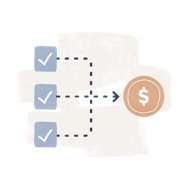Merchant Cash Advance
Merchant cash advances provide small businesses with an alternative from traditional bank loans. Business owners receive funds as a lump sum upfront from a merchant cash advance provider and repay the advance with a percentage of the business’s sales

Merchant Cash Advance Details
Loan Amounts
$2,500 – $500,000
Interest rates
10 – 350% APR
Repayment Terms
3 – 36 months
Turnaround Time
1 – 7 days
Pros
- Fast access to cash
- Flexible repayment terms
- Strong credit not required
- You choose how to use
- No collateral required
Cons
- Very, very expensive (70% – 200% APR)
- Minimum daily payment hurts cash flow
- Doesn’t help build business credit
- May lock-in merchant processor
- Must accept credit cards
A merchant cash advance is not a business loan but, should be considered a cash advance based on the volume of your credit card receipts. The funding provider gets paid back by taking a portion of your future credit card sales each day. You can usually get approved in a day or two—with very little paperwork. But you’ll likely pay for this convenience in higher interest rates. Because this option is more expensive than some other options, it’s a good way to take advantage of short-term opportunity that requires fast cash, but can become very expensive if you’re looking for money to bail you out of a financial bind. You don’t want to get in the habit of relying on merchant cash advances since its higher cost can make it very difficult to manage future cash flow.
Get to know Merchant Cash Advance
Gerri Detweiler • October 21, 2020
What is a Merchant Cash Advance (MCA)?
Merchant cash advances provide small businesses with an alternative to other financing, like traditional bank loans. Business owners receive funds as a lump sum upfront from a merchant cash advance provider and repay the advance with a percentage of the business’s sales. An MCA can be an option for businesses that have high credit card sales volume, need funding quickly, or may not qualify for a traditional loan.
Note:
A Merchant Cash Advance is only available to those businesses that process credit cards for payment. If your business doesn’t take credit cards, an MCA will not be available to you.
24/7 business and personal credit alerts
Nav is the ONLY source for both personal and business credit scores. Get alerts, advice and monitoring today.
Merchant Cash Advance Companies
There are a number of companies offering merchant cash advances, and not all are created equally. Some are more prepared to cater to bad credit, others may offer higher limits. Here’s a breakdown for you to help you determine which might be a good fit for your small business.
National Funding
Merchant cash advances usually come with an origination fee, not so with National Funding. While small business owners will still face higher interest rates typical of a merchant advance, National Funding has some one of the lower thresholds for approval for this type of business funding.
Can Capital
It’s difficult for business owners with bad personal credit or a thin business credit profile to get a small business loan, and even more difficult for newer business owners. Can Capital helps bridge that gap, allowing businesses with $4,500 in monthly credit card sales and six months in business to qualify. Be warned, however, their repayment terms are short and higher factor rates result in a higher APR than normal.
Credibly
Another option for startup businesses, Credibly allows small businesses with six months in operation and $15,000 in monthly revenue to qualify. They can also get you funding in 48 hours, making it an even quicker option than a traditional loan or even other merchant financing or merchant advance financing, as well. They charge a 2.5% origination fee and their factor rates bring in higher APR, as well, but it can be a good option for a high-performance startup.
Fora Financial
Another option for startups, Fora only requires six months in business, but has high revenue requirements and an origination fee, unlike National Funding. Despite the high APR and revenue requirements, Fora offers up to $500,000 for a merchant cash advance, much higher than other competitors in the merchant advance game.
American Express Merchant Financing
Not technically a merchant cash advance, American Express Merchant Financing is a short-term loan for businesses that accept American Express credit card payments. If you fall under this category and have held a American Express business credit card for over a year, this could be a much less expensive alternative to a merchant advance.
Fundbox
Perhaps the best option for applicants with bad credit, Fundbox doesn’t actually offer a merchant cash advance, but their lines of credit are a great alternative for borrowers with bad credit. Merchant cash advances traditionally have lower approval thresholds, and Fundbox’s line of credit falls right in line. Borrowers can qualify with a personal credit score of just 500.

How Does a Merchant Cash Advance Work?
When a small business finds itself in a bit of a financial pinch or needs to access capital quickly, there aren’t many options available. This is one of the advantages of a merchant cash advance. A merchant cash advance provider will provide an approved amount, and the merchant will repay the advance with a percentage of each day’s credit card sales. Interest rates on merchant cash advances are often notoriously high, and determined by a factor rate, essentially a multiplier of the principal advance. For example, if a business is approved for $100,000 with a factor rate of 1.5, the total amount to repay would be $150,000 ($100,000 x 1.5). The daily payment would then be determined by the terms of the advance.

You’re 3X more likely to get approved for a business credit card with MatchFactor.
Instantly see your top options for business loans and credit cards based on your business needs using Nav’s MatchFactor.
The factor rate and subsequent APR is determined more by the applicant business’ sales performance. Simply, better revenue numbers can put the applicant in a better situation with a potentially lower factor rate. Merchant cash advances have very low credit requirements, so applicants with bad personal credit or thin business credit profiles can make up for it with solid sales numbers.
What You Need to Know About Merchant Cash Advances
Merchant Cash Advance Pros
Pros
- Fast access to cash
- Flexible repayment terms
- Strong credit not required
- You choose how to use
- No collateral required
The hallmark benefit of merchant cash advances is the fast access to cash. Many issuers can get you the cash within 48-72 hours. They also don’t require sterling personal or business credit, instead putting more weight on credit card and non-invoice sales numbers. Issuers also place little to no stipulations on how the cash is to be used, meaning you have more freedom to use the advance on what you need without any extra hands steering the ship. You won’t need to put up any collateral (other than your future credit card receipts), and providers often offer flexible repayment terms.
Merchant Cash Advance Cons
Cons
- Very, very expensive (70% – 200% APR)
- Minimum daily payment hurts cash flow
- Doesn’t help build business credit
- May lock-in merchant processor
- Must accept credit cards
Merchant cash advances can be very expensive. If you’re pegged with a high factor rate, you can pay up to 200% APR, and even a low factor rate can bring you around 35%. And, because they are not a loan and don’t report your payment history to the business credit bureaus, they won’t help you build business credit, making this an unproductive source of financing for a startup business looking to bulk up their business credit history or profile. Often, with daily required payments and required credit card payments, merchant cash advances can quickly become a cash flow burden if not managed properly.
Merchant Cash Advance Terms and Features
Getting a merchant cash advance is quick and easy, and filing an application can take very little time. With quick approval turnarounds, you can access cash much quicker than with other means of financing, including short-term loans or long-term loans.
Each merchant cash advance will have a principal amount, a factor rate, a payment period, payment frequency (often daily), and a percentage deduction of your daily credit card sales, including future sales.
Best Uses for Merchant Cash Advances:
- Temporary cash flow help
- Purchasing inventory at deep discount
- Unplanned expenses
- Paying other debts due
- Working capital
How to Qualify for a Merchant Cash Advance
Qualifying may be the easiest part of working with a merchant cash advance. Unlike most business financing options, applicants don’t need to have years in business to qualify. The amount and number of your credit card transactions are more important than a business’ credit profile, putting less emphasis on personal and business credit information—solid sales numbers can help a business with poor credit qualify for a merchant cash advance.
Most providers offer online applications, making the already quick process even more convenient for business owners.

Merchant Cash Advance Repayment Structures
Because an MCA is not a loan and is really an advance based upon your credit card volume, the way you repay the advance and the fees you pay might feel unfamiliar with what you are accustomed to. Most MCA providers debit money from your daily credit card transactions to repay the MCA (though some providers allow for weekly debits instead). If your MCA requires daily debits, there is generally no grace period. You should expect to start making daily payments the day following disbursement of funds.
Additionally, there may be a new term or two you should become familiar with. In addition to terms like periodic payment, daily debit, and payback period, there is something called a holdback. Holdback refers to the percentage of your daily credit card transactions that are debited from your account every day. The holdback percentage is usually between 10% and 20% of your daily receipts and remains fixed until the advance is paid in full.
Borrowers often confuse the holdback with the rate you will pay for the advance. If you want to understand the cost of an MCA, the factor rate is key to evaluating it. Most MCAs, when they express the cost, will use a factor rate. Think of it as more of a calculation rather than an interest rate percentage.
Note:
Holdback, interest rate, and factor rate are not the same thingFor example, if you are quoted a factor rate of 1.5, that means that for every dollar you borrow you will pay back $1.50 (or $.50 per dollar). In other words, if you borrow $10,000 at a factor rate of 1.5, you will pay $5,000 back to the MCA provider as your cost of the borrowed capital. $10,000 x 1.5 =$15,000.
In this example, if the holdback percentage was 15% and $5,000 was deposited into your merchant account for today, the holdback would be $750. 15% of $5,000 is $750. If you received $8,000 in your account tomorrow, the holdback amount would be $1,200. 15% of $8,000 is $1,200.
Your holdback amount will vary depending on the credit card receipts in your merchant account. In other words, when you have a big day with a lot of credit card receipts, your periodic payment (based on the holdback) will be larger than slower days with fewer credit card sales.
Because your periodic payments will likely be daily, you’ll want to confirm whether or not those daily payments will be debited only on business days—or will they also include weekends? And, as mentioned earlier, know whether you’ll have weekly or daily debits so you can control cash flow effectively. Daily debits can be frustrating for a business owner not expecting the first payment to be due so quickly.

Do you need more financing?
Sign up for Nav to see what financing options are available for your business.
Is a Merchant Cash Advance Right for Your Business?
A merchant cash advance can be a tool to access capital quickly, but it can also put a business in cash flow jeopardy if you’re not careful. Although there are a number of factors that make an MCA attractive to a business with a weak credit profile, and there are many businesses that use this type of financing to augment a short-term cash flow crunch, a good use for a merchant cash advance is to fund a short-term opportunity to generate additional ROI on a project—like the purchase of quick-turnaround inventory.
The businesses most successful at leveraging an MCA are those that are borrowing to augment some kind of ROI-generating activity, are very mindful of the costs, and understand those costs in relation to the potential ROI gain. If that describes you, a merchant cash advance could be a good option for your business.
How Can I Get Out of My Merchant Cash Advance?
If you opted for an MCA because of a weak credit profile and it becomes apparent that the cash flow burden of servicing the advance becomes a cash flow burden your business can’t support, the only real option is to refinance the obligation with a lower-interest loan of some kind. Unfortunately, if you had a weak credit profile before the MCA, qualifying for a small business loan could still be a challenge.
Applying for another MCA to pay off the first can get expensive really fast and might not be the best way to reduce the obligation of the first. Speaking of multiple MCAs, the practice of stacking MCAs one on top of each other can get expensive really fast and is not refinancing nor is it generally recommended.
The most cost-effective way to refinance a merchant cash advance is with a conventional small business loan. Interest rates are usually much less than a cash advance and often include more favorable terms, if you qualify. Maintaining a personal credit score above 650 (the minimum threshold to apply for a loan with the SBA) and a good business credit history will be required to qualify for a conventional loan. Most traditional banks have a minimum personal credit threshold of 680.
Other options could include asset-based loans. An asset-based loan allows a business owner to capitalize on assets like Accounts Receivables, inventory, or real estate to secure financing. An asset-based loan will be more expensive than a traditional small business loan (though usually less than an MCA), but will be easier to qualify for in a less-than-perfect personal and business credit situation.
Depending on the asset, an asset-based loan could be treated as a revolving credit line or a more traditionally amortized loan.

What Happens if You Default on a Merchant Cash Advance?
It probably goes without saying, but defaulting on a merchant cash advance should be avoided. Most providers will, like many lenders, include a personal guarantee in their contract and will likely pursue your personal, as well as business assets, to recoup on their advance. And, although MCA providers don’t regularly report your payment history to the business credit bureaus, they will report a default—making it more difficult to get financing in the future.
Alternatives to Merchant Cash Advances
A merchant cash advance is simply one of several financing options available to a small business—even with a less-than-perfect credit profile. Here are some of those other options:

Online Small Business Loan:
Many online lenders offer both short- and long-term business loans that can meet the needs of a small business. Different lenders require different credit thresholds, but even if your business wouldn’t qualify for an SBA loan or a loan at the bank, there are options.

Business Cash Advance:
Different from a merchant cash advance in that it is based on your cash flow, has a fixed payment (still potentially daily or weekly depending on the lender), and will likely include a lower interest rate than a typical merchant cash advance.

Factoring:
Although factoring is not a small business loan, but rather selling your Accounts Receivables at a discount to access cash now rather than waiting for your customers to pay their invoices, it is a viable way to access short-term capital (provided your customers pay by invoice).

Accounts Receivable Financing:
Unlike factoring, AR financing is a loan secured by the value of your receivables.
A lender will typically report your loan payment history to the appropriate business credit bureaus, meaning your good credit practices will help improve your business credit profile in addition to providing you with access to borrowed capital.

Nav’s Verdict: Merchant Cash Advance
Proceed with caution! If you don’t qualify for other financing because of less-than-perfect credit, merchant cash advances could help. But you should be cautious and have a plan for how it will increase revenues more than the cost. This should strictly be a short-term solution. Make sure you calculate the true cost of the advance. The details can be tricky.
Related Resources
- SBA Loans
- Bank loans
- Merchant Cash Advance
- Microloans
- Cash Flow Loans
- Online Business Loans
- Construction Business Loans
- Retail Business Loans
- Restaurant Loans & Financing Options
- SBA 7(a) Loans
- SBA Express Loans
- Business Credit Cards
- Equity Crowdfunding
- Reward-Based Crowdfunding
- Equipment Financing
- Invoice Financing
- How Trade Credit Can Help Your Business
- Medical Practice Loans
- Manufacturing Business Loans
- Commercial Real Estate Loans
- SBA Microloans
- SBA 504 Loans
- SBA Disaster Loans